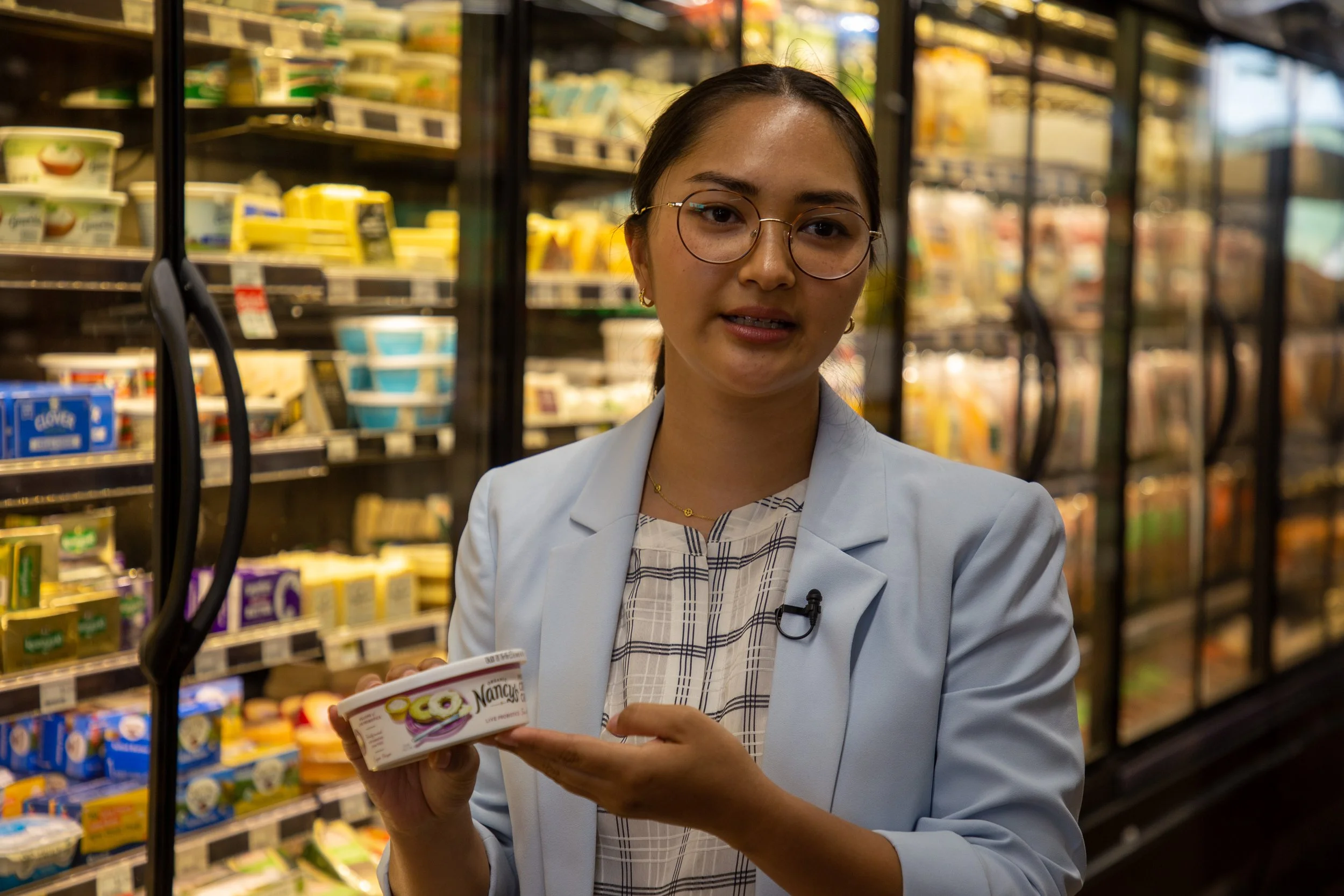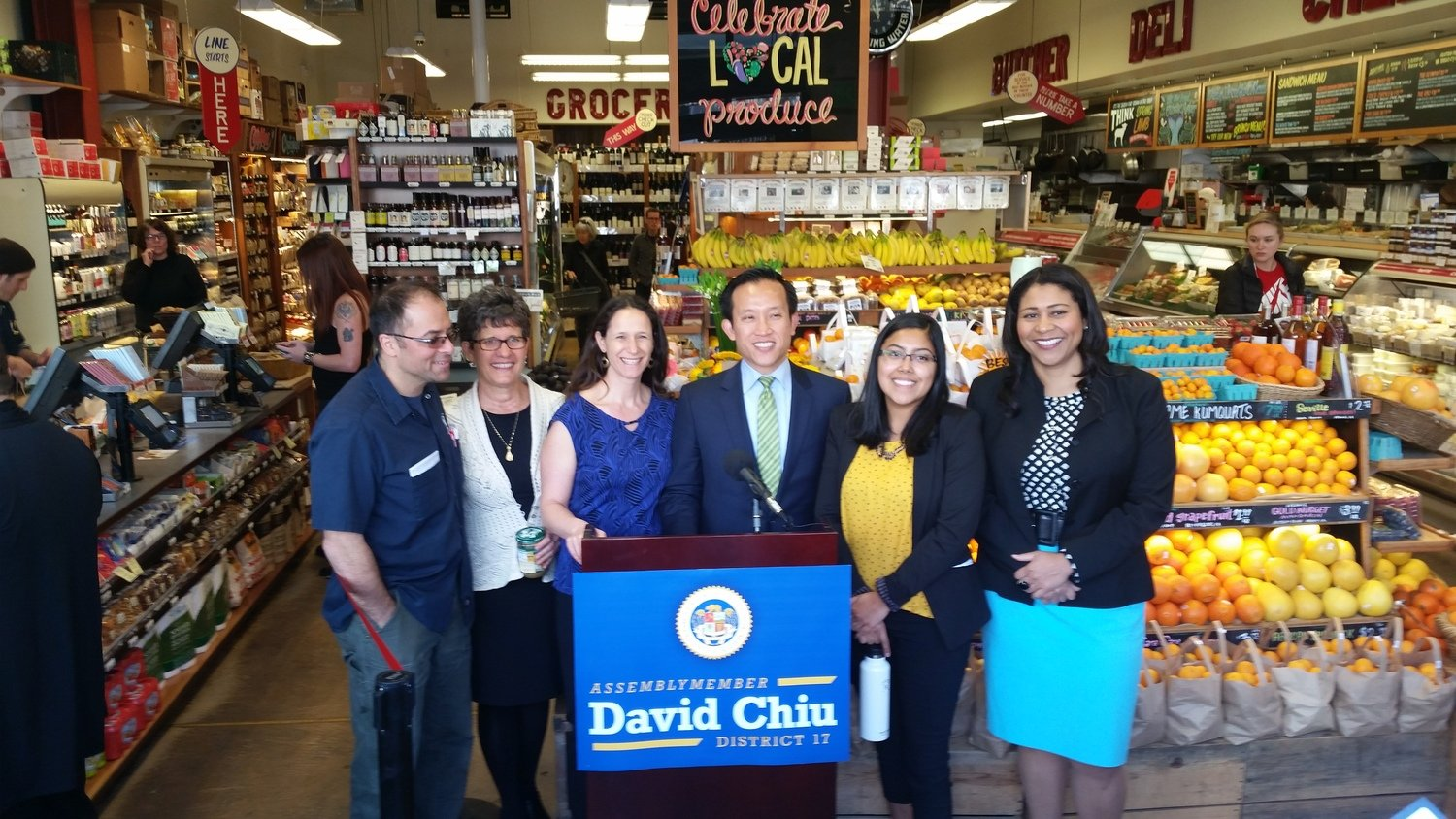California Becomes First State to Ban “Sell By” Dates on Packaged Foods
Governor Gavin Newsom signed AB 660, which bans the use of consumer-facing “Sell By” dates and requires the use of standardized food date labeling terminology, reducing consumer confusion and the environmental and socio-economic impacts of food waste
Erica Parker, Policy Associate with Californians Against Waste speaks on the importance of simplifying confusing expiration dates. Photo courtesy of the Office of Assemblymember Jacqui Irwin.
SACRAMENTO – In a major victory for consumers and the environment, Governor Gavin Newsom signed the nation’s first mandatory food date labeling reform bill. Assembly Bill 660 standardizes confusing date labels that result in unnecessary food waste across the state. Authored by Assemblymember Jacqui Irwin, AB 660 received bipartisan support, and marks a pivotal step toward a more sustainable future for California.
On grocery store shelves today, there are more than 50 differently phrased date labels on packaged food. Some phrases are used to communicate peak freshness of a product or when a product is no longer safe to eat. Others, like “sell by,” are used only to inform stock rotation in stores but mislead some consumers into thinking the product is no longer safe to eat.
AB 660 will close this gap by requiring manufacturers to use the same phrase for date labels across their products. Starting July 1, 2026, “BEST if Used By” will be used to communicate peak quality, and “Use By” will be used to communicate product safety. To further reduce confusion on food date labeling, AB 660 prohibits the use of consumer facing “sell by” dates, reducing the likelihood of confusing “sell by” dates with quality and/or safety dates. This small change will accelerate California’s progress towards achieving a more efficient and secure food system.
Californians Against Waste & NRDC staff join Assemblymember Irwin to announce the introduction of AB 660 in 2023. Photo courtesy of the Office of Assemblymember Jacqui Irwin.
“Having to wonder whether our food is still good is an issue that we all have struggled with,” Assemblymember Jacqui Irwin said. “By strengthening labeling standards and reducing food waste, AB 660 will keep money in the pockets of consumers while helping the environment and the planet.”
“The inconsistent use of phrases like “Sell By,” “Expires On,” “Freshest Before,” and others makes for an impossible-to-navigate system for consumers who don’t want to throw away good food or make their families sick,” said Erica Parker, a Policy Associate with Californians Against Waste, a co-sponsor of AB 660. “The result is a staggering amount of food waste – Californians throw away six million tons of food waste each year – and confusion over date labels is a leading cause.”
“Right now, we have an opportunity to address one of the leading drivers of food waste – confusion around food date labels,” said Victoria Rome, director of California government affairs at NRDC (Natural Resources Defense Council), the other co-sponsor of the bill. “Standardizing food date labels is a commonsense solution that will keep more money in people’s pockets and food on families’ plates, while reducing climate warming emissions.”
Californians Against Waste's former Legislative Director Nicole Kurian demonstrates how confusing date labeling can be to consumers.
The widespread confusion over date labels exacerbates California’s food waste crisis – an issue that contributes to climate change and squanders natural resources. Decomposing food and other organic waste in landfills accounts for 41 percent of the state’s point-source methane emissions. For context, methane is 84 times more powerful than carbon dioxide as a driver of global warming. Therefore, minimizing food waste is integral to the success of meeting California’s existing greenhouse gas reduction goals.
Reducing confusion of food date labels is especially critical considering the cost to households – the average American spends $1,300 on food that is never eaten. Tossing food prematurely because of misleading date labels costs Californians billions each year. In a time of rising grocery bills and food insecurity, every bit of savings helps. For years, Californians have grappled with the uncertainty of food date labels. AB 660 will empower Californians to make informed decisions about their food, which will reduce unnecessary waste of edible, nutritious food, with the added benefit of keeping money in their pockets.
Californians Against Waste & NRDC staff are joined by London Breed and SF Environment's Debbie Raphael at Bi-Rite Market, as then-Assemblymember David Chiu introduces AB 2725 in 2016.
Despite the severity of consumer confusion today, recent years have seen an increase in stakeholder and community momentum surrounding date label standardization. Following the failure of AB 2725 (Chiu) in 2016, Gov. Jerry Brown signed AB 954 (Chiu, 2017), which directed the state to promote the voluntary adoption of the FDA-supported phrases “Best if Used By” and “Use By.” In the years following AB 954, adoption of these standards has been supported by producers and proven commercially viable for brands to undertake, but comprehensive implementation of these standards has fallen short. AB 660 simply mandates the use of these standards across all products in California.
AB 660 is supported by a diverse coalition of food banks, local governments, food recovery organizations, and environmental groups— demonstrating the broad support for this change. This landmark legislation represents the sum of years of good faith efforts from stakeholders and advocates across the state. AB 660 sets an important precedent for other states and the federal government to follow. By taking decisive action to standardize date labels, California is not just addressing a local issue but is paving the way for a nationwide movement to reduce food waste, save consumers money, and fight climate change.
Here’s what others are saying:
Senator Ben Allen, D- Santa Monica
“Californians rein in our estimated 6 million tons of annual food waste. Providing commonsense labeling for food products will help address a number of key issues such as landfill emissions, wasteful grocery costs, water conservation, and supply chain constraints. I’m grateful for Assemblymember Irwin’s leadership on this over the last two years on behalf of California consumers and the environment.”
City Attorney David Chiu, City and County of San Francisco:
"I'm thrilled to see that with the Governor's signature on AB 660, Assemblymember Irwin has finished work that has been years in the making. As the original author of California's first food date labeling law in 2017, I applaud Assemblymember Irwin for her persistence in ensuring that standardized date labels will reduce consumer confusion and food waste."
Dana Gunders, President, ReFED:
“AB 660 is game changing, not just for California, but for the country. It will be the first law of its kind to end the ridiculous confusion that causes consumers to throw out almost $15B of perfectly good food nationwide. It will also help reduce the significant toll that wasting food has on our planet.”
Gracyna Mohabir, Clean Air and Energy Regulatory Advocate, California Environmental Voters:
“California’s methane management strategy is more critical than ever, and we’re glad to see Governor Newsom sign AB 660 as a means of keeping good food out of landfills. This is a simple, yet tremendously helpful change that clears up confusion for consumers and reduces food waste.”
Fiona Hines, Legislative Advocate, California Public Interest Research Group (CalPIRG)
“Using our precious resources to grow food, only to throw it away, is absurd. When food is thrown away, we are wasting the land, energy, water, and care that went into producing it. By standardizing food labels, California is taking an important, common-sense step to reducing food waste.”
Xochi Hernandez, Sustainability Program Manager, Alameda County Community Food Bank
“With 22% of California households estimated to be food insecure (26% of households with children), standardizing date labels would help ensure healthy food is consumed by those who need it most, and not wasted due to confusion that can arise from different date formats. Standardization and consumer understanding of clearer date labels would also lead to increased dignity at food distributions, allowing consumers to have a clear understanding that the food provided is healthy and safe to consume.”
###
Assemblymember Jacqui Irwin represents California’s 42nd Assembly District, which includes portions of both Ventura and Los Angeles Counties; including all of Agoura Hills, Bel Air, Beverly Glen, Brentwood, Casa Conejo, Calabasas, Hidden Hills, Lake Sherwood, Malibu, Moorpark, Oak Park, Pacific Palisades, Santa Susana, Simi Valley, Thousand Oaks, Topanga, Westlake Village, and portions of Camarillo.
Californians Against Waste is a co-sponsor of AB 660. Founded in 1977, Californians Against Waste is a non-profit environmental research and advocacy organization that identifies, develops, promotes, and monitors policy solutions to pollution and conservation problems posing a threat to public health and the environment. Californians Against Waste's history has demonstrated it to be the nation's oldest and most effective non-profit environmental organization advocating for the implementation of waste reduction and recycling policies and programs.
NRDC (Natural Resources Defense Council) is a co-sponsor of AB 660. NRDC is an international nonprofit environmental organization with more than 3 million members and online activists. Established in 1970, NRDC uses science, policy, law, and people power to confront the climate crisis, protect public health and safeguard nature. NRDC has offices in New York City, Washington, D.C., Los Angeles, San Francisco, Chicago, Beijing, and Delhi (an office of NRDC India Pvt. Ltd).




